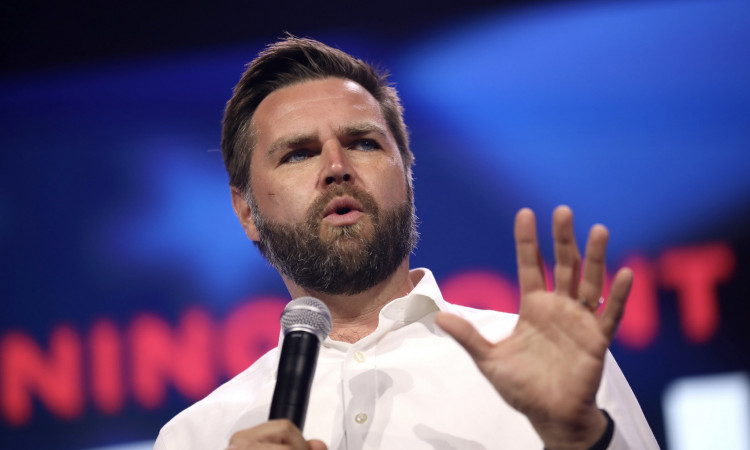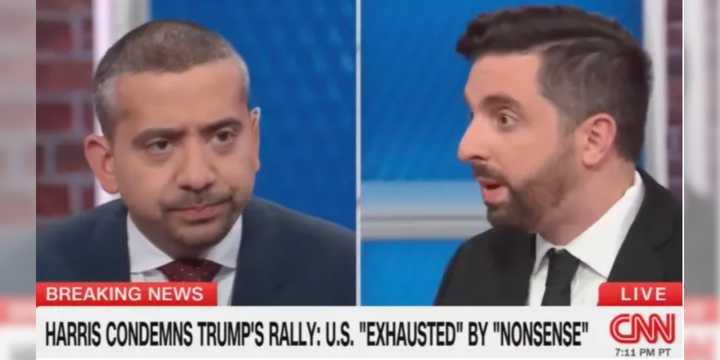Is a single sentence enough to define a career, or does context truly matter? The recent controversy surrounding conservative commentator Ryan Girdusky has ignited a fierce debate about free speech, the boundaries of political discourse, and the consequences of crossing the line in the high-stakes world of cable news.
The incident, which unfolded during a prime-time appearance on CNN's "NewsNight" on Monday, involved a pointed remark made by Girdusky to Muslim journalist Mehdi Hasan. After Hasan, during a discussion, stated his support for Palestinians, Girdusky responded with a comment that has since been widely condemned: "I hope your beeper doesn't go off." This seemingly innocuous statement, however, carries significant weight, especially when considering the historical context of anti-Muslim sentiment and the potential for it to be interpreted as a veiled threat. The fallout from the comment was swift and decisive.
| Full Name | Ryan James Girdusky |
| Date of Birth | (Information not publicly available) |
| Place of Birth | New York, USA |
| Education | (Information not publicly available) |
| Political Affiliation | Conservative, Supporter of Donald Trump |
| Occupation | Political Consultant, Writer |
| Known For | Political commentary, writing on conservative and national populist themes. |
| Publications | The Washington Examiner, The American Conservative Magazine, The Week, Human Events, The Daily Caller, Townhall.com. |
| Website/Social Media | National Populist Newsletter (Substack) |
| Notable Works | Author of the upcoming book "They're Not Listening: How the Elites Created the National Populist Revolution." |
CNN, taking immediate action, removed Girdusky from the panel during a commercial break and subsequently banned him from future appearances on the network. This decision was accompanied by a public statement from CNN, indicating that Girdusky would "no longer be welcome on the network" due to his "offensive remark." The network's swift response underscores the seriousness with which they viewed the commentator's statement, signaling a zero-tolerance policy for what was perceived as a breach of journalistic ethics and potentially, a form of hate speech. Other panelists on the show also condemned Girdusky's comment, further isolating him and highlighting the consensus that his words were inappropriate.
- Crystal Lust Unveiling The Actresss Life Career Everything You Need To Know
- Indigo White Unfiltered Content Hot Mess Channel
The impact of Girdusky's remark and CNN's response has reverberated throughout the media landscape, prompting a broader discussion about the standards of conduct expected of political commentators. Critics of Girdusky have described his comment as "racist," pointing to the potential for it to be interpreted as a veiled threat. Such interpretations draw on the history of Islamophobia and the ways in which seemingly innocuous statements can be used to express or incite prejudice. These critics argue that his comments went beyond the bounds of acceptable political debate, veering into territory that could be seen as harmful or even dangerous.
In the wake of the controversy, the question of free speech and its limits has taken center stage. While Girdusky and his supporters may argue that his comment was a joke or a misunderstanding, others contend that it was a deliberate provocation with potentially harmful consequences. The debate touches on the delicate balance between the right to express one's views and the responsibility to do so in a way that does not incite hatred or endanger others. This tension is particularly acute in the context of cable news, where inflammatory rhetoric can often garner attention and boost ratings, but at the cost of a civil and informative exchange of ideas.
Girdusky, for his part, has defended his comment, claiming it was intended as humor. On social media, he wrote, "You can stay on CNN if you falsely call every republican a..." The implication being that the outrage was overblown and that CNN was being hypocritical in its condemnation. However, many observers see this response as an indication that Girdusky does not fully grasp the gravity of his comment and the potential harm it could cause. His defense highlights a pattern of behavior where those accused of making offensive remarks often downplay their actions or deflect blame, rather than taking responsibility for their words.
- Akira Nakai The Rwb Legend Porsche Maestro Unveiled
- Julin Lvarez Tour Dates Tickets Concert Info Dont Miss Out
This incident is not an isolated event. The media landscape is increasingly characterized by polarization, with commentators and media outlets often catering to specific audiences and reinforcing existing biases. In this environment, the potential for misunderstandings and misinterpretations is high, and the risk of inflammatory rhetoric is ever-present. The Girdusky situation serves as a case study in how quickly a single comment can escalate into a major controversy, leading to professional repercussions and a broader debate about the nature of political discourse.
The context of the comment is crucial. It was made during a discussion about the Israeli-Palestinian conflict, a topic that is fraught with sensitivity and potential for misunderstanding. Mehdi Hasan, the journalist targeted by Girdusky's remark, is a Muslim who has expressed support for Palestinians. In this context, Girdusky's comment could be interpreted as an expression of anti-Muslim bias, particularly when considered in conjunction with the historical use of coded language to denigrate or threaten minority groups. The intersection of political, religious, and cultural identities makes the situation even more complex.
Girdusky's background as a political consultant with ties to the world of conservative politics adds another layer to the story. His work on various political campaigns and his writing for publications with a conservative leaning suggest that he is deeply embedded in the right-wing media ecosystem. This context is important because it sheds light on the potential influences and biases that may have shaped his comment. It also raises questions about the role of political consultants in shaping public discourse and the extent to which they are willing to engage in inflammatory rhetoric to advance their agendas.
The incident has also brought attention to the role of social media in shaping public opinion. After the comment, Girdusky's name trended online, with users expressing a range of opinions. Some condemned his remark, while others defended him, highlighting the degree to which the online environment has become a battleground for political debate. Social media platforms, which often amplify extreme viewpoints, have the power to shape public perception and influence the narrative surrounding controversies like this one.
The controversy also has implications for the future of political discourse. The ban imposed by CNN underscores the importance of upholding standards of decency and respect in the media. However, it also raises questions about the extent to which media outlets should censor or punish commentators for expressing controversial views. Some argue that such actions stifle free speech and limit the range of perspectives available to the public. Others maintain that media organizations have a responsibility to create a safe and inclusive environment where all voices can be heard, and where inflammatory rhetoric is not tolerated.
The implications extend beyond the world of cable news. Girdusky's actions have served as a warning to anyone who participates in the public sphere: words have consequences. The ability to communicate effectively and respectfully is a fundamental skill in a democratic society. As political polarization continues to intensify, the need for thoughtful, civil discourse is greater than ever before. This incident serves as a stark reminder of the importance of responsible communication and the potential damage that can be caused by careless or malicious remarks.
The story is not simply about the comment made on CNN, it also reflects the broader political and social divisions in American society. The rise of national populist movements, which Girdusky writes about in his upcoming book, reveals a deep dissatisfaction with the status quo and a growing sense of alienation among many Americans. It is important to understand the forces that drive these movements, even when we disagree with their views. Failing to do so could have further dangerous consequences for democratic norms.
The case of Ryan Girdusky may well become a lesson for aspiring commentators and established media personalities alike. It is a clear example of how one seemingly off-the-cuff remark can alter one's trajectory, leading to professional setbacks and public condemnation. It forces the audience to question the line between legitimate political commentary and potentially harmful rhetoric and, more broadly, considers the importance of respectful and thoughtful exchange of ideas in a polarized environment.
The fallout from Girdusky's comment is far from over. The repercussions will likely shape his career and provide a case study for others in the media landscape. The incident prompts essential questions about how we communicate with each other, what constitutes acceptable speech, and how media organizations should respond to instances of potentially offensive behavior.
- Rachael Leigh Cook Movies Age Latest News 2024 Updates
- Mila Solana Bio Facts Where To Find Her Online 2024


